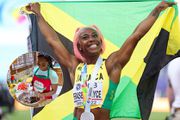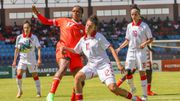Shelly-Ann Fraser-Pryce has reflected on Jamaica’s sprinting dominance, explaining why it is just getting started despite the Paris Olympics dissapointment.
Jamaican sprint queen Shelly-Ann Fraser-Pryce has shed light on the key factor behind Jamaica’s sustained dominance in sprinting over the years, particularly in the face of fierce competition from nations like the United States.
For decades, Jamaica has been a sprinting powerhouse, consistently producing elite sprinters in both the men’s and women’s categories.
The nation’s dominance in women’s sprinting can be traced back to 2004 when Veronica Campbell-Brown defeated Allyson Felix to clinch gold in the 200m final at the Athens Olympics. Since then, Jamaican female sprinters have frequently occupied podium spots at major global events.
PAY ATTENTION: Follow us on Google News, Stay informed with Latest Sport News
Shelly-Ann-Fraser-Pryce will go down as perhaps the greatest female sprinter of all time, but what does she eat that has played a key role in creating her legendary career?
Fraser-Pryce made history in 2008 by becoming the first Caribbean woman to win Olympic gold in the 100m, a feat she repeated in 2012.
Elaine Thompson-Herah then continued the streak, securing back-to-back golds in the 100m at the 2016 and 2020 Olympics. Despite injuries preventing Fraser-Pryce, Thompson-Herah, and Shericka Jackson from defending their supremacy at the 2024 Olympics, Jamaica’s legacy remains intact.
On the men’s side, Usain Bolt cemented his status as the greatest sprinter of all time, holding world records in the 100m and 200m while accumulating eight Olympic gold medals and 11 world titles.
)
Usain Bolt has expressed disappointment in Yohan Blake and others for failing to follow Coach Glen Mills’ guidance, which led to their struggles.
Fellow Jamaican sprinters like Yohan Blake and Asafa Powell also played crucial roles in upholding the nation’s sprinting reputation.
Following a brief transitional phase, Jamaica appears to be on the rise again, with emerging stars such as Kishane Thompson, Oblique Seville, and Ackeem Blake stepping up to reclaim their dominance on the global stage.
Speaking to Togethxr, Fraser-Pryce shared her insights into what makes Jamaican sprinters so successful:
“When it comes to track and field, our pride is sky-high,” Fraser-Pryce said. “We are so competitive.
“The reason we are dominant is because of the work our past athletes have put in. We’ve seen the Merlene (Otteys), the Don Quarries, the Juliet Cuthberts, Grace Jacksons, and Veronica Campbell-Browns—we’ve seen the work they have done, and it gives us hope.”
The five-time world 100m champion emphasized the mindset that fuels Jamaica’s sprinting culture:
“It’s about going out there and feeling like it’s mine for the taking—boldly stepping into that zone where ‘I belong here, I want this, I deserve this, and I have worked hard for it.’”
Fraser-Pryce also touched on the unique energy Jamaicans bring to the sport:
“We want to stand out. We have never been a country that sits back and lets things flow. We want to be the center of attention. We bring vibes and authenticity, and now that I look at everything we have accomplished, there is still more to come. I am proud to have been a part of that legacy.”
With young Jamaican talents rising through the ranks, Fraser-Pryce’s words serve as a reminder that the nation’s sprinting dominance is built on decades of hard work, pride, and an unshakable belief in their ability to be the best. And as she confidently states—there is still more to come.







)



